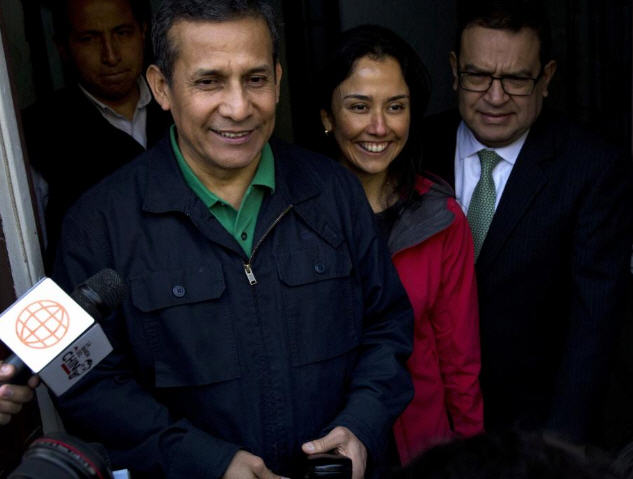
Peru’s Constitutional Court ruled Thursday to release former President Ollanta Humala and his wife Nadine Heredia, serving pre-trial custody since July 2017 while investigations continue on possible money laundering related to campaign funds received in 2011 from the Brazilian construction firm Odebrecht.
The news of the court’s decision came Thursday morning when Heredia and their three children had joined Humala at the Barbadillo prison in east Lima to celebrate their eldest daughter’s birthday. Heredia was returned to the Chorrillos women’s prison in the afternoon. The Humala defense attorneys hope to resolve the situation Friday so that the Humalas can be home by the weekend.
In its ruling, the Constitutional Court criticized the Judiciary for two rulings on earlier Humala appeals that stated as fact that the Humalas were “the authors of crimes,” going against the principle of presumption of innocence. This was also the basis for the appeal presented by defense attorney, Alberto Otárola — the right to be presumed innocent.
The Court itself had been criticized for postponing the debate on the appeal at least twice, including earlier this month when, despite one of the justices leaving his vote in a sealed envelope to be opened if he was away on vacation at the time of the debate, the justices decided to wait until his return.
In constitutionalist Anibal Quiroga’s view, the Court’s well-grounded ruling “severely questions the performance of the Judiciary and the District Attorney’s offices” and is a warning about what is going on in Peru’s judicial system and the abuse of pre-trial custody in unwarranted cases.
Much of the pressure to detain the Humalas was political, fanned by a trip to Canada by the Humala daughters during mid-year school vacations in 2017, which was seen as a test run for the family to flee the country. An unsuccessful bid by Heredia to work with FAO in Geneva was also seen as an attempt to seek refuge.
Neither Humala nor Heredia have yet to be charged with any crime, despite ongoing investigations since early 2015 when contents from four of Heredia’s personal notebooks were leaked to the press. The notebooks including campaign funding details had been stolen from their home by the housekeeper and given to a congressman once loyal to their Nationalist Party.
Perhaps the weightiest argument in the Humalas’ favor is that they are not the only players in the Odebrecht-related investigations — key state witnesses in Brazil, former Odebrecht officers, have confirmed that they financed the presidential campaigns of Keiko Fujimori, Alan Garcia — neither of whom have received the same scrutiny— and Pedro Pablo Kuczynski, who cannot leave the country; and the CEOs of three Peruvian companies related to Odebrecht bribes who were serving pre-trail detention have already been released.
Investigations will continue, and both Humala and Heredia will have to report periodically to the district attorney’s office.
There are few limits in Peruvian campaign fund legislation, and it is not a crime to receive funds from corporations or from abroad, so the focus on the Humalas is of possible money laundering.
Most legal analysts, however, believe the facts do not show the Humalas were involved in money laundering but there is no statute of limitations on this crime and therefore the district attorney’s office has more time to continue its investigations. The same investigation is being made on former President Kuczynski, since the limitations on the crimes he allegedly committed when serving as a cabinet minister in the Toledo administration would expire within the next year or so.






The mood in the country is one that favors creating new legislation that would abrogate the laws that allow crimes against the state, particularly, financial, or economic, that after a certain term, expire and whose perpetrators cannot be judged or punished. Such laws benefit only the biggest and most consummate crooks. If such legal reform is passed, the likelihood is that the would-be “friends of the court,” cloaked as respectable jurists, particularly constitutional jurists, and criminal attorneys, supported and applauded by “complacent” congressmen, as well as by the requisite captains of industry complicit in these crimes with high level state bureaucrats, would argue that it could not apply to crimes committed before its promulgation, allowing the plundering of state coffers, past or current, to continue unpunished, in the context of a silent judiciary, and extreme and visibly-growing poverty.
Former President HUMALA has multiple complaints regarding when he was an active duty officer of the Peruvian Army, all this crimes has prescribe or denied even they were for crimes against human beings assassination and kidnappers, now the Peruvians justice is traying to do the same in the money laundering process, Humala and his wife Nadine Heredia were trying to be reelected but they could not do it. We must take care of Humala, when he wants he kill who accused him, the same occurred to his driver in revenge for leaking notes books to police.